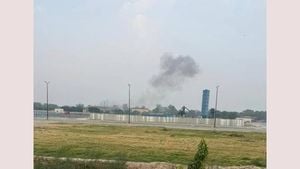Air traffic controllers guiding planes bound for Newark Liberty International Airport experienced a significant communication failure on April 28, 2025, which has led to ongoing disruptions at one of the nation’s busiest airports. The outage lasted nearly 90 seconds, during which controllers lost radar and radio communication with pilots, creating a chaotic situation that has since resulted in numerous flight delays and cancellations.
According to sources familiar with the incident, the failure occurred at a Federal Aviation Administration (FAA) facility in Philadelphia, which took over airspace management for Newark from a site in New York last July. This facility has faced multiple technology failures, raising concerns over the reliability of air traffic control systems in the region.
On that fateful day, as controllers struggled to regain communication, United Airlines Flight 1951, traveling from New Orleans to Newark, attempted to reach the control tower five times before finally establishing contact. "United 1951, how do you hear me?" the controller asked, to which the pilot responded, "I got you loud and clear, United 1951," as recorded by LiveATC.net.
The situation escalated quickly, with one controller informing a pilot, "We lost our radar so just stay on the arrival and maintain 6000 feet." This communication breakdown left controllers unable to see or communicate with about 15 to 20 flights at that moment, leading to a dangerous lapse in air traffic management.
Following the incident, several air traffic controllers reported experiencing trauma, with multiple employees taking leave due to stress. The National Air Traffic Controllers Association (NATCA) confirmed that controllers were visibly shaken, with some shedding tears and at least one suffering stress-induced heart palpitations.
In the aftermath, United Airlines announced the cancellation of 35 daily round trips at Newark, while Delta Air Lines also reported cutting a “small number” of flights due to air traffic control constraints. Newark handled over 48 million passengers last year, making it a critical hub for both international and domestic flights.
The FAA is currently facing a staffing shortage of approximately 3,000 air traffic controllers, exacerbating the ongoing issues. Transportation Secretary Sean Duffy has indicated that the agency is working to enhance the reliability of telecommunications equipment in the New York area and plans to unveil a strategy to upgrade the air traffic control system soon.
As the chaos unfolded, the average delay for flights arriving at Newark reached four hours, with over 160 flights canceled on May 5 alone, contributing to a week of travel disruptions. Flight tracking website FlightAware reported that Newark accounted for more than a quarter of all flight cancellations nationwide that day.
In an effort to address passenger frustrations, United Airlines has implemented flexibility waivers for customers affected by the delays. Passengers with flights booked on or before May 4, 2025, that were scheduled between May 6 and 17, are eligible for these waivers.
Colin Scoggins, a former air traffic controller, described the experience of losing communication as traumatic. He likened it to driving with a blindfold, stating, "Imagine driving down the highway in traffic and someone puts a blindfold over your eyes and tells you to keep driving. When you come back from driving blind, you have to figure out what to do next." Such incidents raise alarms about the potential for future accidents if these communication failures continue.
Despite the FAA's acknowledgment of the staffing and equipment issues, filling the vacant positions remains a challenge. New applicants must be younger than 31 years to meet the mandatory retirement age of 56, which further complicates the hiring process.
Looking ahead, Secretary Duffy has promised a radical transformation of the air traffic control system, aiming to replace outdated infrastructure with more modern technology. He stated, "We use floppy disks. We use copper wires. The system that we’re using is not effective to control the traffic that we have in the airspace today." This overhaul is expected to take three to four years to fully implement.
As the aviation industry grapples with these ongoing issues, experts have voiced concerns about the safety implications of overworked and stressed air traffic controllers. Peter Goelz, former managing director of the National Transportation Safety Board, remarked, "You cannot expect humans to function at their highest level for sustained periods of time with this kind of pressure on them."
The incident at Newark Liberty International Airport serves as a stark reminder of the vulnerabilities within the air traffic control system and the urgent need for modernization and adequate staffing. With air travel expected to continue rising, addressing these challenges will be critical to ensuring the safety and efficiency of the nation’s airspace.



